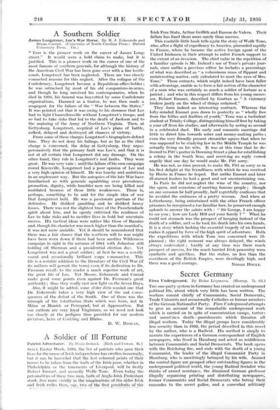A Southern Soldier
. .
James Longstreet, Lee's War Horse. By H. J. Eckenrode and Bryan Conrad. (University of North Carolina Press : Oxford University Press. 15s. ) " Tills is the pioneer work on the career of James Long: street." It would seem a bold claim to make, but it is justified. This is a pioneer work on the career of one of the most famous of southern generals, for although the history of
the American Civil War has been gone over with a fine tooth- comb, Longstreet has been neglected. There are two closely connected reasons for this neglect. After the collapse of the Confederacy, Longstreet became a Republican office-holder ; he was ostracised by most of his old companions-in-arms,
and though he long survived his contemporaries, when he died in 1904, his funeral was boycotted by some Confederate organisations. Damned as a traitor, he was then made a scapegoat for the failure of the " War between the States." It was pointed out that it was owing to his slowness that Lee had to fight Chancellorsville without Longstreet's troops, and
so had to take risks that led to the death of Jackson and to the maiming of the Army of Northern Virginia. Then, at Gettysburg, Longstreet, sceptical of Lee's plans of battle, sulked, delayed and destroyed all chances of victory.
From some of these charges Longstreet's biographers defend him. They do not deny his failings, but as far as the chief charge is concerned, the delay at Gettysburg, they argue persuasively that the primary fault was Lee's, and that it is not at all certain that Longstreet did any damage. On the other hand, they rub in Longstreet's real faults. They were great. He was very vain ; until the failure of his own campaign round Knoxville, Longstreet had a poor opinion of Lee and a very high opinion of himself. He was touchy and ambitious in an unpleasant way. But the autopsies of the late War have familiarised us with generals squabbling over precedence, promotion, dignity, while humbler men are being killed and mutilated because of these little weaknesses. There is, perhaps, something to be said for the simple idea of war that Longstreet held. He was a passionate partisan of the defensive. He disliked gambling and he disliked heavy losses. There was not the slightest trace of the Passchendaele spirit about him, and he openly criticised the readiness of Lee to take risks and to sacrifice lives in bold but uncertain moves. His tactical ideas were rather like those of Bazaine and, though his character was much higher than the marshal's, it was not more amiable. Yet it should be remembered that there was a fair chance that the northern will to war might have been worn down if there had been another Wilderness campaign in sight in the autumn of 1864 with Johnston still holding off Sherman and a presidential election due. Yet Longstreet was not a great soldier ; at best he was a usually sound and occasionally brilliant corps commander. This life is a notable addition to the literature of the Civil War (if its authors will permit the term) even if its dedication to Dr. Freeman recalls to the reader a much superior work of art, the great life of Lee. Yet Messrs. Eckenrode and Conrad make good some points even against Dr. Freeman's great
authority; thus they really cast new light on the Seven Days. Also, it might be added, some otiter dicta remind one that Dr. Eckenrode takes a very high view of the sad conse- quences of the defeat of the South. One of them was the triumph of the totalitarian State which was born, not in Milan or Munich or Petrograd, but at Appomattox. But
our authors are very loyal Virginians, so we need not look too closely at the pedigree thus provided for our modern dictators, heirs of Conkling and Blaine. D. W. 13rlocAx.






































 Previous page
Previous page